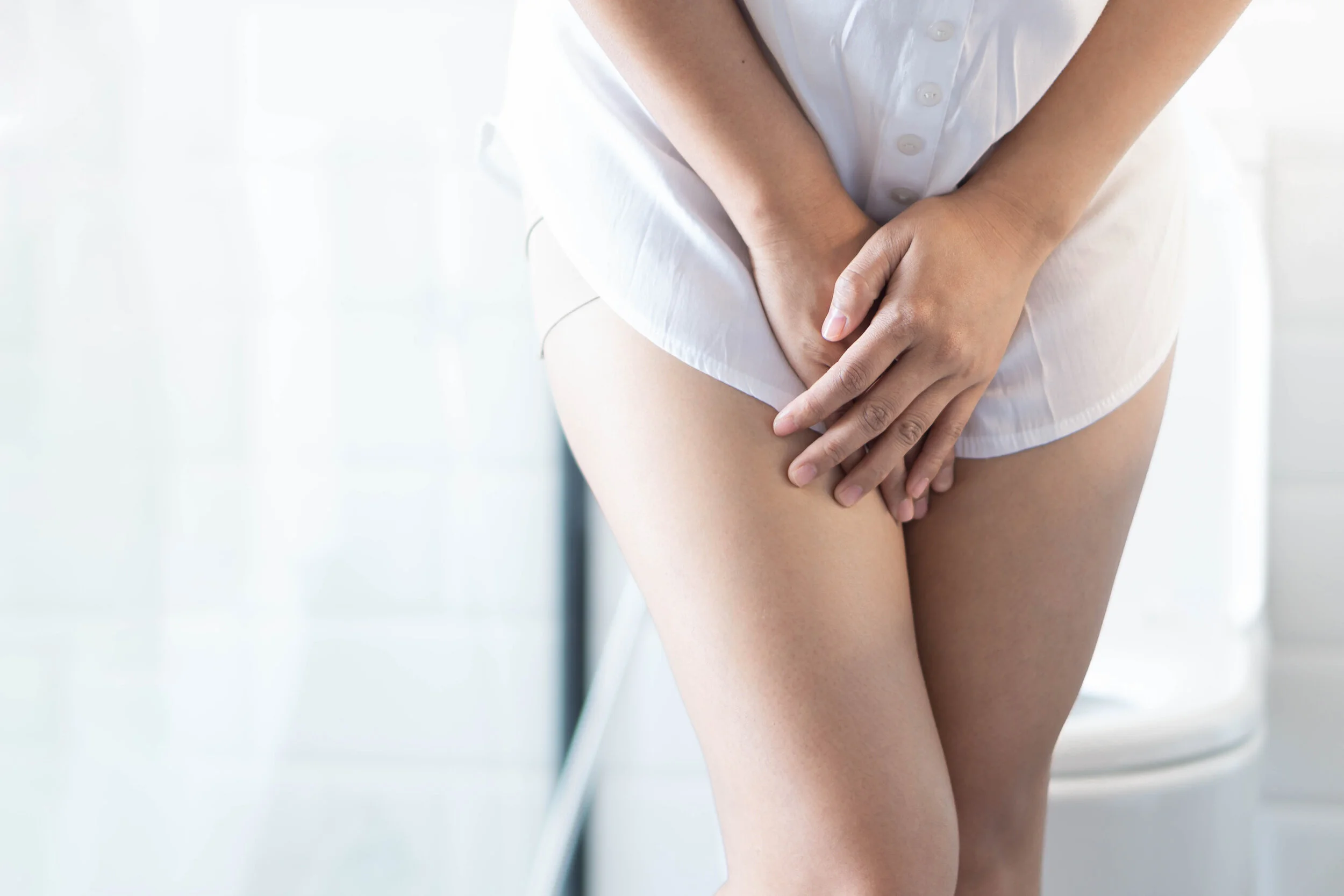Why Do I Always Have To Pee? We Asked A Urologist & Menopause Expert To Weigh In
/Feeling like you always have to pee? Trust me, you are not alone. The constant feeling of having to pee—and the urgency associated with that feeling—is very common in women, especially post-menopausal women.
I have experienced this myself during and after menopause, and never understood why it was happening. So for this week’s blog post, I decided to interview Dr. Angelish Kumar, a female urologist, menopause expert, and founder of Women’s Urology New York!
Here’s what she had to say about why this urge to pee happens as we get older, and what you can do about it!
Why does this happen?
According to Dr. Kumar, the constant need to urinate is referred to as overactive bladder. This includes symptoms like 1) frequently needing to use the bathroom, 2) feeling a strong sense of urgency once you realize you have to use the bathroom, and 3) feeling like you can’t hold it for a little while. Sometimes this is accompanied by “urge incontinence,” where you actually leak before you reach the toilet. Overactive bladder and urge incontinence, she says, can happen for a few reasons.
Reason #1: They’re a normal part of aging.
“As we age, the brain becomes less effective at inhibiting the bladder. So normally when you’re toilet trained and you learn to start controlling when you urinate, you allow your brain to have input over whether it’s an appropriate time to go. So even when your bladder is filling and stretching and sending signals to your spinal cord and brain telling you ‘it’s time to empty your bladder,’ your brain is able to quiet those signals and say it’s not an appropriate time. Thus, you’re able to hold it until you’re near a bathroom or have time to find one.
But, as you get older, the brain is just not as good at sending those inhibitory signals. So when the bladder stretches to a certain degree and you start feeling the need to urinate, you just can’t control it. This happens to both men and women with age.”
Reason #2: You have weakness in your pelvic floor (this is specific to women)
“Many women have weakness in their pelvic floors, which can lead to urge incontinence. Weakness in the pelvic floor typically happens as the result of pregnancy and childbirth. Essentially, this creates a situation where the bladder is in a more descended position, and you can’t hold your urine as well because your pelvic floor is not supporting the bladder like it used to.”
Reason #3: Menopause can make the bladder more sensitive.
“Around the time of perimenopause and when you’re postmenopausal, the lack of estrogen in your body makes the bladder more sensitive. We usually think of hot flashes and hormonal body hair when we think of menopause symptoms, but the lower urinary tract, the bladder, the urethra, and the pelvic floor are also estrogen sensitive—so you may experience overactive bladder as a result of menopause.”
Reason #4: Gynecologic surgeries and UTIs can cause overactive bladder symptoms.
“There are so many reasons why women can start developing overactive bladder symptoms and feel like they just can’t hold it like they used to. For instance, gynecologic surgeries or urinary tract infections (UTIs), which happen more frequently as you get older, can affect the state of the bladder in terms of its neurological input. For example, if you’re someone who has recurring UTIs, it’s likely that you’ll feel overactive bladder symptoms even when you don’t have a UTI, because the bladder is in a state of inflammation and irritation.”
What you can do about it
Now you may be thinking to yourself: “Okay now that I know why it’s happening, what can I do about it?” Thankfully, Dr. Kumar has a few suggestions.
The first is simple… you should seek out a specialist. They will put together a treatment plan for you, and you’ll get better advice from them than you would a primary care doctor or another doctor who doesn’t specialize in women’s urology.
In case you’re wondering what a treatment plan could include, here’s what you can expect:
The specialist may recommend pelvic floor therapy.
“For an overactive bladder, pelvic floor physical therapy is definitely effective and it’s considered a first line of therapy. When you do pelvic floor physical therapy, you’re doing exercises that restore the support to your bladder. It actually helps your bladder know that it’s not an appropriate time to urinate, and it helps calm down that strong signal from the bladder that you need to pee. Pelvic floor therapy can definitely help an overactive bladder.”
The specialist may recommend fluid management.
“I often work with women who are drinking a lot of water, like three to four liters of water a day—and it’s probably much more than they actually need. Most people don’t need more than one to two liters of water a day. So a lot of times we’ll do something called a bladder diary to see exactly what you’re drinking and how much urine you’re making. From there, we decide what to do.
Fluid management can include anything from cutting back on water intake if you’re hydrating excessively, to changing the nature of the fluids, like drinking less coffee, Redbull, or diet soda. Caffeine is not only a bladder irritant, but the sugar substitutes and other chemicals in those drinks can irritate your bladder and cause overactive bladder symptoms. The bladder diary helps us get a good sense of what you’re drinking and how much—from there, we see if there’s any low hanging fruit that we can modify that would help with your bladder symptoms.”
They may work with you to retrain your bladder.
“Let’s say you’re going to the bathroom every hour—which is happening a lot now that people are working at home and the bathroom is right there. When you start going to the bathroom that often, your bladder and brain start becoming accustomed to a lower volume and you feel a sense of urinary urgency.
So with bladder retraining, the goal is to build how much urine you can store in your bladder before your brain perceives that you urgently need to urinate. We may have you urinate on a schedule so that you’re not going as often, and teach you techniques to help you defer the urge to urinate so often, like pelvic floor therapy. Sometimes we have patients do things like count backwards from 100 by seven, just to mentally distract them and delay that urge. This is an instance of the brain taking over and saying ‘this is not an appropriate time, I’m doing something,’ and the signals from the bladder start to quiet down. So bladder retraining can help you gain better cognitive control over your bladder.”
If these methods are unsuccessful, there are other treatment options like medications, Botox injections, and even acupuncture-like techniques.
“For some women, these methods are not enough to relieve their symptoms, and in those cases, we have a number of other options. We have medications which work really well, and those actually work directly on the nerves in the bladder to help it store urine more comfortably. We also do forms of neuromodulation, which is very similar to acupuncture, where we place a needle sort of near the ankle, and that helps to modulate the signaling from the bladder nerves from a peripheral location. And then there’s Botox—we can do Botox injections in the bladder and those also work very well. So whatever your specific issue is, chances are we have an effective and safe solution.”
The bottom line
The takeaway here is that if you’re experiencing overactive bladder or urge incontinence symptoms, your best course of action is to see a urologist or urogynecologist—a specialist who is trained in urinary issues and knows how to treat them. With a specialist, you’re guaranteed to get the full range of options, which you wouldn’t necessarily get at your general internist.
As Dr. Kumar puts it:
“My advice is: don’t sell yourself short. We seek out specialists for so many other medical problems—if you had a rash and your general internist gave you a medication that didn’t work, you would definitely go see a dermatologist. Urinary issues require a specialist too! Not every menopause doctor or gynecologist specializes in urinary issues. Do a bit of research and find someone who specializes in the problem you have.”
Enjoy this article? For more content like this, make sure to check out the Pure Joy Squad—our private community for women over 50, where I share all of my weekly blog articles, expert insights, and the tips and tricks that helped me pre and post-menopause!
Xo,
Renata


